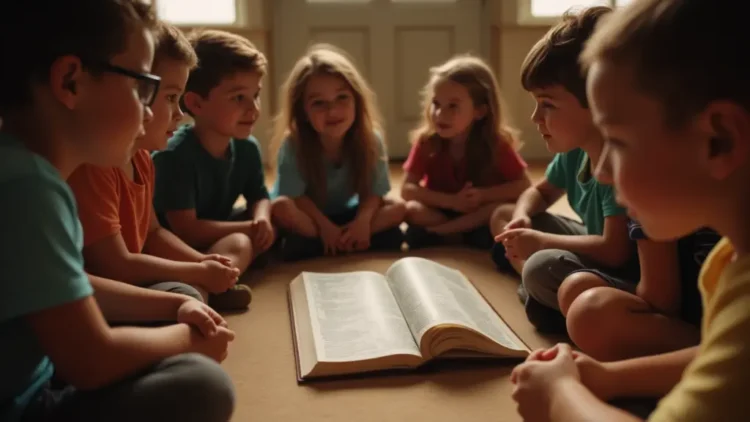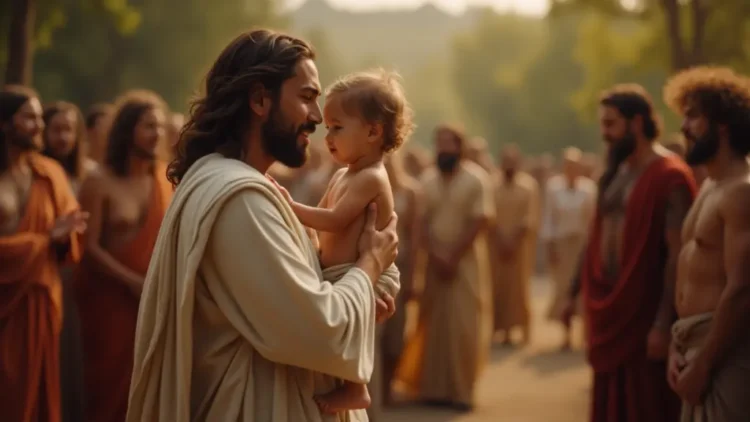God’s Love for Children
36 Bible verses about children tells us many things which we have to know. for this lets dive into the full article given below:
Matthew 19:14
From the very words of Jesus, we learn how deeply God cherishes children. When others tried to push them away, He gently welcomed them, saying, “Let the little children come to me.” This shows us that God’s heart is always open to the innocent and pure. It’s a clear message for today’s parents, leaders, and communities — never underestimate the value of a child. Jesus didn’t just see them as the future; He saw them as important in the present. In our busy world, this verse reminds us to slow down and honor the simplicity and trust children naturally have. It’s a glimpse into heaven’s values. Every child matters to God, and so should they to us.
Isaiah 40:11
This verse paints a beautiful image of God as a gentle shepherd, gathering lambs in His arms. When applied to children, it speaks volumes about His tender care. Children often face confusion and fear, but God promises to carry them close to His heart. It’s more than poetic — it’s personal. Whether you’re a parent or teacher, this reminds us that God’s approach to children is filled with comfort, not pressure. It’s a verse that inspires us to reflect that same calm and protection in our own homes and classrooms. He doesn’t rush them — He leads them gently.
Luke 18:16
Once again, we hear Jesus insisting that children belong in the kingdom of God. But more than that, He says the kingdom belongs to them. That flips our assumptions. Often, adults think they must teach kids about faith, but here, Jesus hints that children can teach us too. Their trust, joy, and honesty are qualities heaven values. This verse reminds us to not just care for children, but to learn from them. In our parenting and ministries, we must embrace their example — it’s not childishness, it’s kingdom-heartedness.
Children Are a Blessing from the Lord
Psalm 127:3
This well-known verse declares that children are a heritage from the Lord, a reward from Him. It counters a culture that sometimes sees kids as burdens. Instead, God calls them blessings. It’s not just about the gift of having children but about seeing their purpose in your life. Each child carries potential, joy, and the chance to continue a godly legacy. In Biblical times, children were signs of hope. And today, that’s still true — they bring laughter, purpose, and an opportunity to raise a new generation with faith.
Psalm 128:3
This verse offers a vivid picture of family life rooted in God’s blessing. It describes children as olive shoots around your table — full of promise, growth, and fruitfulness. Olive trees take time to grow but eventually provide lasting value. In the same way, raising children may feel slow and hard, but it’s richly rewarding. God promises that those who walk in His ways will experience this kind of flourishing family life. It’s not just poetic — it’s a vision for what godly homes can look like when centered on faith.

Genesis 33:5
Here, Jacob humbly acknowledges that his children are gifts from God. After a long separation from Esau, Jacob doesn’t boast about wealth or land — he points to his family as a sign of divine grace. This verse gently reminds us not to take credit for what we’ve been given, especially our children. Instead, it invites us to see them through God’s eyes — as blessings entrusted to us. Whether through birth, adoption, or spiritual mentorship, every child is a reflection of God’s goodness in our lives.
Raising Children in Faith
Proverbs 22:6
This timeless principle urges us to train children in the way they should go — and when they’re older, they won’t depart from it. While not a strict formula, it’s a wise observation about consistency. Teaching faith early on builds a foundation that stays. Even when kids wander, those seeds of truth often bring them back. It’s an encouragement for every parent who feels weary — your efforts matter. You’re not just teaching habits; you’re shaping hearts for eternity. Raise them with truth, and God handles the rest.
Deuteronomy 6:6–7
These verses give parents and leaders a blueprint for raising kids in faith. God doesn’t just want His words heard at church — He wants them discussed at home, during walks, meals, and bedtime. The message is clear: teaching faith isn’t a one-time lesson; it’s a lifestyle. Children absorb what we live, not just what we say. These verses challenge us to weave God’s truth into everyday moments. It’s not about perfection, but presence. Faith grows when it’s rooted in daily family life.
Ephesians 6:4
Paul gently instructs fathers not to provoke their children to anger, but to bring them up in the training of the Lord. This is powerful because it balances discipline with love. God doesn’t want us to crush children’s spirits but to guide them with patience and purpose. Faith-based parenting means listening, correcting with kindness, and building trust. This verse speaks directly to the responsibility and heart of a parent. It’s about leading with grace, not fear.
Teaching and Guiding Children
Proverbs 1:8–9
These verses honor the role of parents as first teachers. A father’s instruction and a mother’s teaching are compared to a graceful garland and a chain — something valuable and beautiful. What we teach children, especially in faith and character, becomes part of their identity. In a noisy world filled with mixed messages, godly guidance gives clarity. This reminds us that our voices matter in shaping their lives. Teach them with wisdom, and it becomes part of who they are.

Isaiah 54:13
God promises that all your children will be taught by the Lord, and great will be their peace. That’s more than encouragement — it’s a promise to hold onto. Even when you feel inadequate, God steps in as the ultimate teacher. Parents and pastors plant seeds, but He waters them with grace. It’s a verse of hope for every family — peace will come when children are grounded in God’s truth. No matter the world around them, God promises to guard their hearts.
Colossians 3:21
This verse warns parents not to discourage their children. It’s easy to demand obedience and forget the emotional world of a child. But God sees beyond behavior — He cares about the heart. When children are constantly criticized or pressured, they lose heart. This verse reminds us to lead with compassion, not control. Raise your voice with care, your hands with patience, and your heart with grace. That’s how faith and love grow side by side.
The Faith and Purity of Children
Matthew 18:3
Jesus made it clear that unless we become like little children, we cannot enter the kingdom of heaven. That’s a powerful statement — not because children are perfect, but because they trust without hesitation. Their faith isn’t based on facts or formulas; it’s born out of pure dependence. This verse highlights the kind of simple, wholehearted belief that pleases God. In today’s skeptical world, children show us how to believe without overthinking. Their open-hearted faith is something we’re meant to learn from, not grow out of.
Mark 10:15
This verse echoes the same idea: unless we receive the kingdom like a child, we’ll miss it. It doesn’t say we need to act childish, but childlike — trusting, hopeful, and free from pride. Jesus values their honesty and humility. They don’t come to Him with credentials, only open hands. If you’ve ever wondered how to approach God, this verse gives the answer: come as you are, with full trust. Children remind us that God isn’t impressed by status — He’s moved by sincere hearts.
Psalm 8:2
This verse is a poetic reminder that God uses even the smallest voices to silence the strongest enemies. From the mouths of babes comes strength — not physical, but spiritual. In a world that often underestimates children, God honors their innocence and praise. Their worship has real power. Whether it’s a simple prayer or a joyful song, their expressions of faith carry weight in heaven. This verse reminds us not to dismiss their spiritual life — God certainly doesn’t.

God’s Plans for Children
Jeremiah 1:5
This verse tells us God knew us before we were even born — a truth that extends to every child. He doesn’t just notice them once they grow; He designs them with purpose from the start. For every worried parent, this verse is a deep reassurance: your child is not random or forgotten. God’s plans aren’t reserved for adulthood. They begin in the womb. He has something meaningful for every child — including yours — to become, build, and bless.
Isaiah 44:3–4
Here, God promises to pour out His Spirit on our children and bless them richly. It’s a vision of growth — like trees by water — fresh, green, and full of life. This verse offers hope for generations. Even in spiritual drought, God can cause your children to thrive. His Spirit isn’t limited to adults or leaders; it reaches into nurseries, schools, and homes. You’re not raising your child alone. This promise says God is investing in them too.
Joel 2:28
Joel speaks of a time when God’s Spirit will fall on all people — including sons and daughters who will prophesy. This is not just future talk; it’s a present reality. God includes children in His plans for revival and renewal. Don’t underestimate what God can do through young voices. Whether in church, school, or family, your child may speak God’s truth in ways that challenge and change others. Joel reminds us that spiritual gifts are not limited by age.
Obedience and Respect in Childhood
Ephesians 6:1
“Children, obey your parents in the Lord” — it’s a straightforward command, but full of meaning. Obedience isn’t just about rule-following; it’s a sign of spiritual maturity even in young hearts. It helps build discipline, trust, and unity at home. When children learn respect early, it shapes their relationships for life. This verse also comforts parents — you’re not alone in expecting obedience; God is backing you up. Teaching respect is one way families reflect God’s order.
Exodus 20:12
This is one of the Ten Commandments, and it comes with a promise: honoring parents leads to a longer, better life. That’s no small thing. Respect begins at home. God takes family roles seriously because they shape how we relate to Him and to others. When children honor their parents, they are actually honoring God. This verse is timeless — its value holds whether you’re in ancient Israel or today’s digital world. Respect is always relevant.
Proverbs 20:11
Even a child is known by their actions — that’s the message here. Kids are not invisible or insignificant; their behavior speaks volumes. This verse invites us to teach children integrity early. Their habits, choices, and words matter to God. It’s not about perfection, but about being mindful. When children are raised with honesty and kindness, people notice — and so does God. Every small act builds a reputation. This verse encourages both parents and children to care about character.

Protection and Care for the Little Ones
Matthew 18:10
Jesus gives a serious warning here: don’t despise or harm children, because their angels always see the face of the Father. That’s a bold statement. It tells us heaven pays attention to how we treat the smallest among us. Children are not just cute — they’re spiritually connected and protected. This verse is a call to guardianship. Whether you’re a parent, teacher, or neighbor, you have a holy duty to care for and protect children. God is watching — lovingly and seriously.
Psalm 91:11
This verse speaks of angels commanded by God to guard His people — and that includes children. In times of fear, danger, or sickness, this is a verse to hold onto. God doesn’t leave kids unprotected. He sends divine help. For worried parents, this verse is peace in motion. You may not always be near your child, but God is. This verse encourages trust. You’re not the only one watching over them — heaven is, too.
Proverbs 14:26
Those who fear the Lord have a secure fortress, and for their children, it becomes a refuge. That’s powerful. A parent’s faith doesn’t just bless their own life — it creates a covering over their children. This verse encourages families to build spiritual homes, not just physical ones. When kids grow up seeing their parents trust God, they learn to do the same. It’s not just teaching them safety; it’s showing them where to find it — in God alone.
Children in Worship and Community
Joel 2:16
This verse paints a beautiful picture of community-wide worship, where even infants are included. God’s call to return to Him isn’t limited by age — children belong in sacred gatherings too. Sometimes, we hesitate to involve kids in worship, thinking they’re too young to understand. But this verse reminds us they are part of the spiritual story. Including children in church life teaches them early that worship isn’t a grown-up thing — it’s a God thing, for all ages.

Nehemiah 8:3
When Ezra read the Book of the Law aloud, the people gathered — men, women, and all who could understand, including children. This moment shows the value of community learning. Kids weren’t kept away; they were welcomed into the moment of renewal. This verse proves that children can grasp more than we think, especially when they’re part of a sincere and open-hearted environment. They are not just the future of the church — they are its present, too.
Ezra 10:1
As Ezra wept and prayed, a large crowd gathered, including women and children. Even in times of repentance and communal sorrow, children were present. This verse highlights that kids are not outsiders to spiritual emotion and healing — they witness and sometimes feel it deeply. We shouldn’t shield them from spiritual realities. Instead, we should walk through those moments together. It’s how we teach them that God meets us in both joy and sorrow.
Biblical Examples of Faithful Children
1 Samuel 3:10
Young Samuel hears God’s voice in the night — a story many parents love to share. But it’s more than a sweet bedtime tale; it’s a reminder that God speaks to children. Samuel responded, “Speak, for your servant is listening.” He didn’t wait to grow older to be useful. God used him as a child to begin a prophetic journey. If your child is listening and learning, don’t underestimate it — God might already be speaking to their heart.
2 Kings 5:2–3
In this often-overlooked story, a young Israelite girl, taken captive, points her master toward healing. She could’ve stayed silent, but her courage changed Naaman’s life. This verse teaches that even in painful or unfair situations, children can be vessels of truth. Their words matter. Their actions have power. This unnamed girl reminds us that young hearts can carry strong faith — enough to guide others to God’s grace.
2 Timothy 3:15
Paul reminds Timothy that he’s known the Holy Scriptures since childhood. This verse encourages parents and teachers to start early — the earlier God’s Word enters a child’s heart, the deeper it can grow. Timothy’s faith wasn’t random; it had roots, planted by his mother and grandmother. Faith can be generational, but it’s also personal. A child who learns scripture young is being equipped for life. That’s a gift no one can take away.

Generational Blessings and Legacy
Psalm 103:17
This verse beautifully reminds us that God’s love stretches across generations. It’s not just about one moment or one child — it’s about a legacy. Your faith today impacts your children tomorrow. When we walk in God’s truth, we create blessings that outlive us. This is a comfort for parents who wonder if their spiritual life matters — it does. God’s mercy follows those who fear Him, and that trail reaches your children, too.
Deuteronomy 30:6
Here, God promises to change the hearts of both parents and children so they may love Him with all their heart. This verse brings hope. You’re not alone in leading your child to faith — God is involved. He doesn’t just demand devotion; He enables it. This promise reminds families that transformation is possible, even across generations. No child is too far, and no family too broken, for God to renew hearts and bind them in His love.
Proverbs 17:6
“Children’s children are a crown to the aged,” this verse says — and it highlights the deep joy that family legacy brings. Grandparents, parents, and children all matter in God’s design. This verse encourages older generations to invest in the younger, not just with advice, but with example. When love, wisdom, and faith are passed down, they become a crown — a visible blessing. It’s a reminder that generational influence is sacred and powerful.

Children and God’s Kingdom
Matthew 18:6
Jesus gives a stern warning in this verse: causing a child who believes in Him to stumble is a serious offense. It shows how deeply He values the spiritual well-being of children. This verse isn’t just a caution; it’s a call to protect young faith. Children’s hearts are soft, and the way we treat them shapes how they view God. To nurture their faith is holy work. And to harm it is something God takes personally.
Mark 9:36–37
Jesus didn’t just talk about welcoming children — He physically took a child in His arms and taught the disciples a lesson about greatness. In God’s eyes, welcoming a child is like welcoming Him. That’s an incredible truth. It turns the world’s value system upside down. Children aren’t less than — they’re honored by heaven. This verse encourages us to welcome, love, and value them just as Jesus did.
Luke 1:41
When Mary greeted Elizabeth, baby John leapt in her womb. Even before birth, a child responded to God’s presence. This verse speaks volumes about the spiritual sensitivity of children — even unborn ones. It reminds us that God’s work in a child’s life begins early, even in the womb. Children are not spiritually blank slates — they are already part of God’s plan. Their journey with God starts sooner than we often realize.
Conclusion: The Lasting Power of Bible Verses About Children

From Genesis to Revelation, Bible verses about children remind us that kids are not just part of the story — they are central to God’s heart. God’s love for children is tender, purposeful, and consistent throughout Scripture. He doesn’t see children as too young or unworthy; instead, He often uses them in powerful ways.
Think of Moses, saved as a baby and later chosen to lead a nation. Or Samuel, who heard God’s voice as a child and became a prophet. Even Jesus came into the world as a child, showing that God uses all stages of life to fulfill His divine plan.
Abraham’s story teaches us about generational blessing, while Mary and Elizabeth show us the spiritual depth even unborn children can carry. Through these stories, we learn that raising, teaching, and loving children is sacred work.
The Bible doesn’t just tell us children matter — it shows us. Their faith, purity, and honesty often mirror the qualities God wants from all of us. And when Jesus said, “Let the little children come to me,” He meant it literally and spiritually — children lead us closer to heaven’s values.
In a world that often undervalues kids, the Bible verses about children are a reminder: God values them deeply. Whether you’re a parent, teacher, or mentor, your influence matters. Every word, every prayer, every example you set is planting seeds for eternity.
FAQs
What are the best Bible verses about children?
Verses like Matthew 19:14, Proverbs 22:6, and Psalm 127:3 beautifully highlight God’s love and guidance for children.
How does the Bible view children?
Children are seen as blessings, heritage from the Lord, and examples of faith that adults should follow.
Did Jesus talk about children in the Bible?
Yes, Jesus often welcomed, blessed, and taught about children — emphasizing their importance in God’s Kingdom.
Were there important children in the Bible?
Absolutely! Samuel, Moses, Jesus, and even Timothy are all examples of children who played major spiritual roles.
Why should we study Bible verses about children?
Because they help us understand God’s heart for the young and guide us in raising them with faith and purpose.

